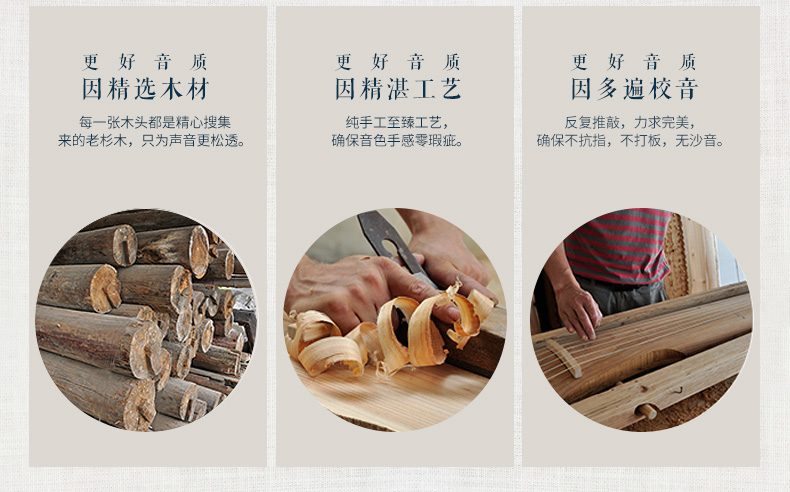买好琴就选“久音古琴” 电话:15150827214 客服微信号:gcds325 (联系客服观看实拍视频)
What Type of Art Must a Chinese Person Master in Order to Play the Guqin Well?
The guqin, one of the oldest and most revered musical instruments in Chinese culture, is more than just a tool for producing sound. It is an art form deeply intertwined with philosophy, aesthetics, and personal cultivation. To play the guqin well, a Chinese person must master not only the technical skills but also the cultural and spiritual essence that defines this ancient instrument.
1. Technical Mastery
First and foremost, playing the guqin requires a high level of technical proficiency. This includes understanding the instrument's construction, the proper way to hold and pluck the strings, and the techniques for producing different tones and timbres. The guqin has a unique system of notation, known as "jianzi pu" (reduced character notation), which combines elements of written Chinese characters to indicate finger positions and playing techniques. Mastering this notation system is essential for interpreting traditional guqin pieces accurately.
Moreover, the guqin is played with the fingers of the left hand pressing the strings while the right hand plucks them. This requires a delicate balance of strength and sensitivity, as well as precise coordination between both hands. Techniques such as "gun" (rolling), "fu" (vibrato), and "tiao" (plucking) must be practiced extensively to achieve the desired sound quality.
2. Cultural Understanding
To truly excel in guqin playing, one must have a deep understanding of Chinese cultural and philosophical traditions. The guqin has been associated with Confucianism, Taoism, and Zen Buddhism for centuries. Confucian scholars saw the guqin as a means of cultivating moral character and harmony, while Taoists appreciated its connection to nature and the flow of the universe. Zen Buddhists, on the other hand, used the guqin as a tool for meditation and spiritual enlightenment.
Understanding these philosophical underpinnings helps a player imbue their music with deeper meaning. For example, the concept of "ziran" (naturalness) in Taoism encourages players to let go of rigid techniques and allow the music to flow naturally from within. Similarly, the Confucian emphasis on "ren" (benevolence) and "li" (propriety) can guide a player to express emotions in a restrained yet profound manner.
3. Aesthetic Sensibility
The guqin is known for its subtle and restrained beauty, which is often described as "qing" (elegant) and "tan" (tranquil). To play the guqin well, one must develop a refined aesthetic sensibility that appreciates simplicity and understatement. Unlike Western instruments that often emphasize volume and complexity, the guqin thrives on quietness and minimalism. Each note is carefully placed to create a sense of space and contemplation.
The traditional guqin repertoire includes pieces that evoke natural scenes, such as "Flowing Water" (《
高山流水》) and "Autumn Moon over the Calm Lake" (《平湖秋月》). These pieces require a player to capture the essence of nature through their music, using delicate nuances of tone and rhythm to paint a vivid picture in the listener's mind.
4. Personal Cultivation
Playing the guqin is not just about performing music; it is also a form of personal cultivation. Historically, the guqin was considered a noble instrument, reserved for scholars and literati who sought to refine their character through music. The process of learning the guqin involves patience, discipline, and introspection. It requires a player to quiet the mind, focus the spirit, and connect with their inner self.
In this sense, the guqin is a mirror of the player's soul. A well-played guqin piece reflects not only technical skill but also the player's emotional depth and spiritual clarity. It is said that the guqin can "cultivate the mind and purify the heart" (修心养性), making it an instrument of both artistic expression and self-improvement.
Conclusion
Mastering the guqin is a lifelong journey that goes beyond mere technical proficiency. It requires a deep understanding of Chinese culture, philosophy, and aesthetics, as well as a commitment to personal cultivation. For a Chinese person, playing the guqin well is not just about becoming a skilled musician; it is about embracing a way of life that values harmony, tranquility, and inner peace. Through the guqin, one can connect with the wisdom of the past and find a sense of balance in the modern world.
古琴
>> 古琴和古筝的区别 古琴牌子 古琴购买 古琴几根弦 古琴
>> 一个专注古琴的知识分享网站

好古琴,久音造!
For a high-quality Guqin, choose "Jiuyin Guqin".
Phone: 15150827214
Customer Service WeChat: gcds325 (Contact customer service to view real-time videos.)
